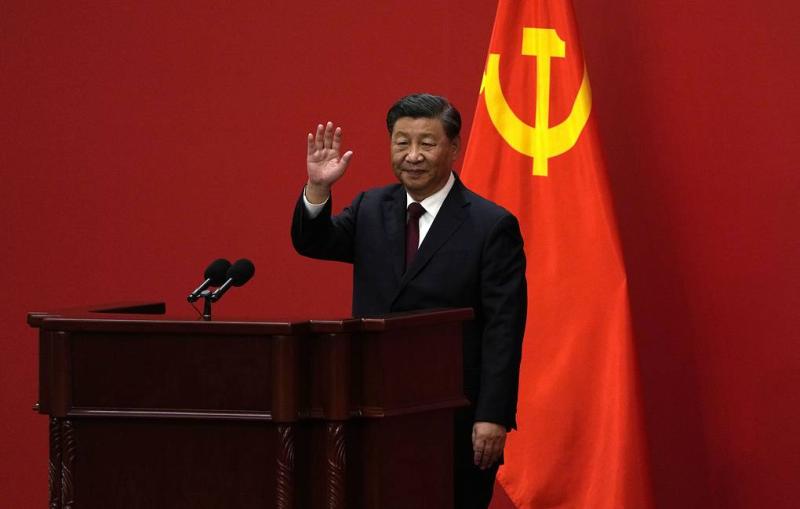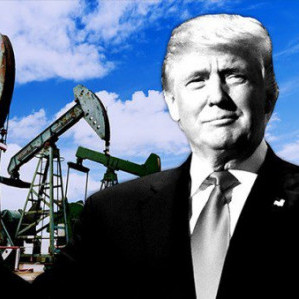
© AP Photo/Andy Wong/TASS
Top stories from the Russian press on Monday, October 24th, prepared by TASS
Media: Xi Jinping strengthens his positions as China’s leader
Incumbent Chinese leader Xi Jinping was reelected for a third five-year term as Secretary General of the Communist Party of China at a plenary session of the party’s Central Committee on Sunday, while four of his former associates in the top party leadership were replaced. As a result, Xi Jinping became the sole, absolute leader of the party and the country. Under his rule, Beijing is expected to pursue the goal of turning China into the world’s leading power by 2049, Kommersant writes.
Director of Moscow State University’s Institute of Asian and African Studies Alexey Maslov believes that "it is about a new policy that’s becoming more ideologized and also tougher." "The time of ‘hardliners’ has come in Beijing as they unite around Xi Jinping, who has cleared the political field for himself, entering the second decade of his rule," the expert pointed out.
No Chinese leader has ever been strong enough to form an entire team of like-minded people. Xi Jinping succeeded in doing that as the four new members of the Politburo Standing Committee of the Chinese Communist Party are the ones whom he can rely on and assign missions of the party and the state, Head of the Center for Asia-Pacific Studies at the Russian Academy of Sciences’ Institute of World Economy and International Relations Alexander Lomanov told Vedomosti.
After the recent Party Congress, Xi Jinping ensured full support for himself and his political course, St. Petersburg University professor Yana Leksyutina emphasized. China will continue the policy that it has been pursuing for ten years because after the Congress, Xi Jinping will be able to fully implement all his initiatives.
Izvestia: Is Ukraine capable of using ‘dirty’ nuclear bomb?
Russian Defense Minister Sergey Shoigu conveyed Moscow’s concerns about Ukraine potentially using a "dirty" nuclear bomb to his counterparts from the United States, the United Kingdom, France and Turkey. Experts are certain that the Kiev regime is capable of creating such a munition as they have everything that it would take, Izvestia writes.
On October 23, Russian Defense Minister Sergey Shoigu discussed the situation in Ukraine, "which steadily tends to escalate out of control," in a phone call with his French counterpart Sebastien Lecornu. Shoigu expressed his concern about Ukraine possibly staging a false flag involving a "dirty" nuclear bomb. Later, the Russian defense chief held telephone conversations with his counterparts from the UK and Turkey, Ben Wallace and Hulusi Akar. The parties also discussed the Ukraine issue with Russia reiterating concerns about Kiev’s potential use of a "dirty" bomb. In addition, Shoigu also talked with US Secretary of Defense Lloyd Austin.
"What is a ‘dirty’ bomb? Its creation requires picking open a barrel of nuclear waste from some power plant, then putting it into a capsule and blowing it up using 100 kilograms of TNT," military expert Vladislav Shurygin noted.
"However, even in such a case, the explosion would contaminate an area of some 500 meters from its epicenter, or perhaps, one kilometer. It means that there would be contamination but not the same as a nuclear bomb blast can cause. If such a bomb explodes underwater or bodies of water get contaminated, it will all go downstream, seeping into the water via sedimentation and will gradually fade away. I can’t even imagine how much contaminated water it would take to make the Dnieper River radioactive. You may recall that the Fukushima nuclear power plant kept contaminating the sea for six months and no one even noticed it. The Ukrainian authorities’ plan is not quite clear. If then want to blame such an incident on us, it won’t be an easy thing to do because we have ‘clean’ bombs and it’s beyond comprehension why we should use a ‘dirty’ one," the expert emphasized.
Izvestia: West’s drone-related accusations may affect talks on Iran nuke deal
Washington is preparing new sanctions against Russia and Iran over drone supplies, Izvestia writes, citing the US Embassy in Moscow. Although Russia has been denying purchases of drones from Iran, the US still plans to raise the issue at the United Nations. Experts interviewed by Izvestia believe that Washington will use the UAV issue in order to put pressure on Tehran in terms of the nuclear deal talks.
Director of the Center for the Study of Contemporary Iran Radzhab Safarov specifies that even if debates of the drone issue make it to the UN, it will not result in any actions by the UN Security Council because neither Russia nor Iran will support a relevant resolution. Still, it’s possible that the US will not initiate a separate vote but will use mechanisms included in the nuclear deal. In that case, sanctions on Iran will take effect automatically and there will be no need for an additional vote in the Security Council. The Trump administration discussed such a response mechanism in 2020, with the goal of extending an arms embargo against Iran. However, the US did not use the tool then after all.
Senior Research Fellow at the Russian Academy of Sciences’ Institute of Oriental Studies Boris Dolgov believes that "the West may use this opportunity to exert more pressure on Iran, in particular, in terms of the nuclear deal." "Although it is the European Union that needs the agreement the most at the moment due to the energy crisis, Iran is also interested in restoring the deal," the expert stressed.
Meanwhile, in his words, a departure from the deal, or, to be more precise, a failure to restore it, won’t mark a radical change for Tehran because the country has been under sanctions since 1979. The deal was actually suspended back in 2018 (when then US President Donald Trump pulled out unilaterally) so an ultimate rejection won’t be fatal, the analyst explained.
Vedomosti: No one can displace Moscow from talks between Baku and Yerevan
Armenian Prime Minister Nikol Pashinyan and Azerbaijani President Ilham Aliyev may meet in Russia and hold trilateral talks with Russian President Vladimir Putin, Vedomosti writes, citing a diplomatic source. Another source told the paper that the talks might take place in late October, most likely in Sochi.
Russia has persistently been acting as a mediator in talks between Azerbaijan and Armenia and it will maintain this role despite the European Union’s attempts to displace it, head of the Caucasus sector at the Russian Institute for Strategic Studies Artur Atayev noted. According to him, if the leaders meet in Sochi, it won’t be just about a signal for Brussels about Moscow remaining a mediator but substantive talks will also be held.
Both Armenia and Azerbaijan have recently been demonstrating their willingness to sign a peace treaty brokered by Europe and Turkey, Researcher with the Center for Post-Soviet Studies at the Russian Academy of Sciences' Institute of World Economy and International Relations Stanislav Pritchin pointed out. For Baku, it’s important to establish the basis for relations with the West, while Yerevan seeks to get better terms by stepping up talks in the West. However, the change of the negotiating platform has negatively affected Armenia’s position, Pritchin stressed. The country failed to achieve its goals, instead facing the need to recognize the unfavorable results of the 2020 war.
There are good prospects for Russia’s participation in the negotiations because it’s hard to replace it, Pritchin noted. If a peace treaty means that the Nagorno-Karabakh region is fully transferred to Azerbaijan’s jurisdiction, then there will be no one but Russian troops to ensure the safety of the Armenian population during the transition period, until Baku announces an amnesty for participants in the conflict. It’s also impossible to find a solution to the issue of transport corridors without Russia. Armenia’s railroad belongs to the Russian Railways company, while border guards from Russia’s Federal Security Service (FSB) monitor the corridors. Signing a peace treaty in Brussels or Washington will leave many issues unresolved, while Moscow’s participation would be crucial.
Kommersant: Russian trade fleet pivots towards the East
The West’s Russia targeted sanctions have dramatically changed the maritime transport situation. Russian ship calls at the European Union’s ports plummeted 90% in the third quarter of the year, while there have been no ship calls at US and British ports for six months. At the same time, ship calls at Turkish and Chinese ports skyrocketed, Kommersant writes.
Head of Infoline Analytics Mikhail Burmistov expects Russian ship calls at EU ports to plunge to near zero by the second quarter of 2023, after the much-talked-about oil embargo takes effect. The expert believes that Russia will increase cargo flows to Turkey, India and China. Coal will also be shipped to African countries, while oil and petroleum products will be redirected to the Middle East, where pseudo swap deals will take place, with countries buying Russian commodities and oil products at a discount and exporting their own produce.
IPEM analyst Svetlana Petrova, in turn, points out that the eighth package of the EU’s sanctions against Russia includes a ban on all operations with the Russian Maritime Register of Shipping. The register prepared a clarification, saying that starting on April 8, 2023, ships holding its documents might get permission to enter EU ports from the relevant national agencies. "On the whole, ships will continue to call at EU ports to serve Russian and foreign interests so there won’t be a total block of Russian ship calls," the expert said.
In Petrova’s view, interest in transshipping hubs such as Turkey and China will mount, where cargo will be delivered by Russian ships, transferred to vessels flying other flags and then taken to European ports. The remaining transportation volumes may be redirected from the Baltic Sea to the Black Sea and African and Latin American routes will also gain momentum.









